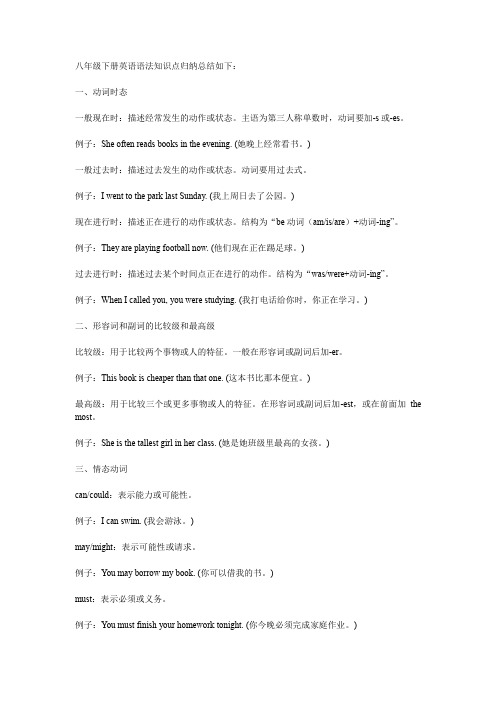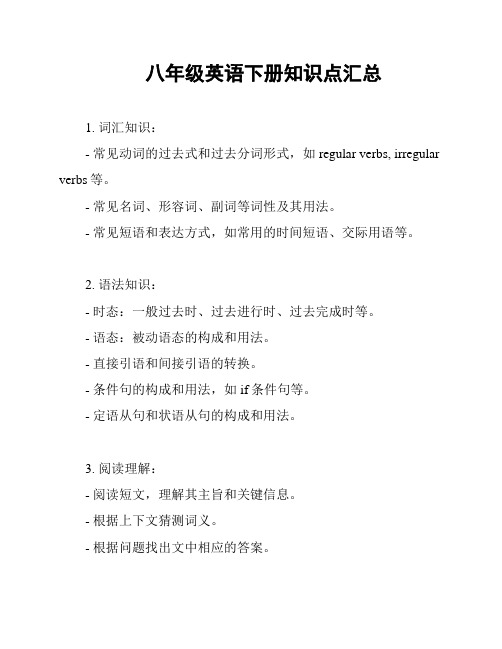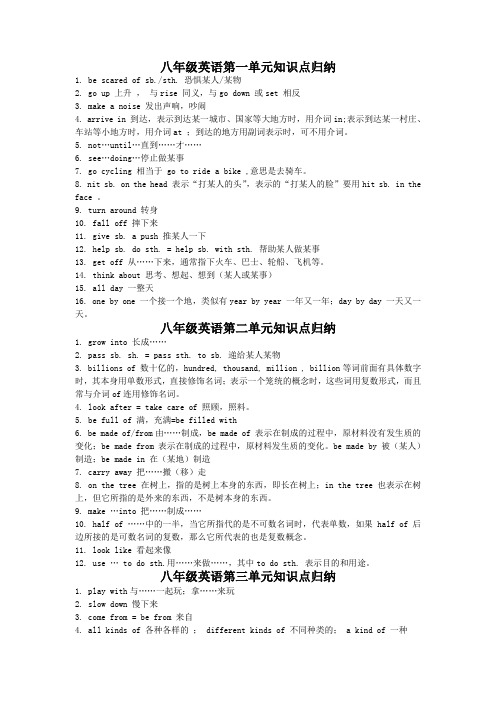八年级下册英语知识点
八年级下册英语所有知识点大汇总

nit1 what' s the matter?1. It’s +形容词 + for sb. + to do sth. 做某事对某人来说是…的。
It’s important to do sth. 做某事很重要。
It’s important for me to eat a balanced diet.平衡饮食对我来说是很重要的.It’s easy to do sth. 做某事是容易的。
It’s easy for us to find out the answer.找出答案对我们来说是容易的。
2. 情态动词should的用法should是情态动词,它的基本用法是必须和其他动词一起构成谓语。
意为"应该......"。
should(应当,应该)用于所有人称,表示劝告或建议。
eg. ---I have a very bad cold. 我感冒很厉害。
---You should lie down and have a rest. 你应该躺下,多喝水。
3. maybe与may be(1)maybe是副词,译为“也许、可能”,相当于“perhaps”。
如:Maybe he can answer the question. 也许他能回答那个问题。
He maybe is from the USA, too. 他可能也来自美国。
(2)may be中的may为情态动词,译为“可能是......”。
如:He may be from the USA, too. 他可能也来自美国。
She may be our English teacher. 她可能是我们的英语老师。
4. few、a few、little、a little的区别和联系:(1)few / a few用来修饰可数名词,few表示否定意义,没有,几乎没有;a few 表示肯定意义,有几个。
例如:He has few friends here, he feels lonely. 他这里没朋友,他感觉寂寞。
八年级下册英语语法知识点归纳总结

八年级下册英语语法知识点归纳总结如下:一、动词时态一般现在时:描述经常发生的动作或状态。
主语为第三人称单数时,动词要加-s或-es。
例子:She often reads books in the evening. (她晚上经常看书。
)一般过去时:描述过去发生的动作或状态。
动词要用过去式。
例子:I went to the park last Sunday. (我上周日去了公园。
)现在进行时:描述正在进行的动作或状态。
结构为“be动词(am/is/are)+动词-ing”。
例子:They are playing football now. (他们现在正在踢足球。
)过去进行时:描述过去某个时间点正在进行的动作。
结构为“was/were+动词-ing”。
例子:When I called you, you were studying. (我打电话给你时,你正在学习。
)二、形容词和副词的比较级和最高级比较级:用于比较两个事物或人的特征。
一般在形容词或副词后加-er。
例子:This book is cheaper than that one. (这本书比那本便宜。
)最高级:用于比较三个或更多事物或人的特征。
在形容词或副词后加-est,或在前面加the most。
例子:She is the tallest girl in her class. (她是她班级里最高的女孩。
)三、情态动词can/could:表示能力或可能性。
例子:I can swim. (我会游泳。
)may/might:表示可能性或请求。
例子:You may borrow my book. (你可以借我的书。
)must:表示必须或义务。
例子:You must finish your homework tonight. (你今晚必须完成家庭作业。
)四、被动语态被动语态用于描述事物的状态或描述被动发生的动作。
结构为“be动词(am/is/are/was/were)+动词的过去分词”。
八年级英语下册知识点汇总

八年级英语下册知识点汇总
1. 词汇知识:
- 常见动词的过去式和过去分词形式,如regular verbs, irregular verbs等。
- 常见名词、形容词、副词等词性及其用法。
- 常见短语和表达方式,如常用的时间短语、交际用语等。
2. 语法知识:
- 时态:一般过去时、过去进行时、过去完成时等。
- 语态:被动语态的构成和用法。
- 直接引语和间接引语的转换。
- 条件句的构成和用法,如if条件句等。
- 定语从句和状语从句的构成和用法。
3. 阅读理解:
- 阅读短文,理解其主旨和关键信息。
- 根据上下文猜测词义。
- 根据问题找出文中相应的答案。
4. 写作技巧:
- 书面表达:写信、写作文等。
- 口头表达:进行简短的演讲、对话等。
- 语法和拼写的正确应用。
5. 听力技巧:
- 听取关键信息,如对话中的时间、地点、人物等。
- 根据对话内容回答问题。
- 培养对不同语速和语调的听力理解能力。
以上是八年级英语下册的主要知识点汇总,希望对你的学习有所帮助!。
八年级英语下册知识点总结归纳

八年级英语下册知识点总结归纳Unit 1 What’s the matter?【重点短语】1.have a fever 发烧2.have a cough 咳嗽3.have a toothache 牙疼4.talk too much 说得太多5.drink enough water 喝足够的水6.have a cold 受凉;感冒7.have a stomachache 胃疼8.have a sore back 背疼9.have a sore throat 喉咙痛10. take risks 冒险11.hot tea with honey 加蜂蜜的热茶12.see a dentist 看牙医13.get an X-ray 拍X 光片14.take one’s temperature 量体温15.put some medicine on sth. 在……上面敷药16. give up 放弃17. sound like 听起来像18. all weekend 整个周末19. in the same way 以同样的方式20. go to a doctor 看医生21. go along 沿着……走22. on the side of the road 在马路边23. shout for help 大声呼救24. without thinking twice 没有多想25. get off 下车26. have a heart problem 有心脏病27. to one’s surprise 另某人惊讶的是28. thanks to 多亏了;由于29. in time 及时30. make a decision 做出决定31. get into trouble 造成麻烦32. right away 立刻;马上33. because of 由于34. get out of 离开;从……出来35. keep on doing sth. 继续或坚持做某事36. put a bandage on sth. 用绷带包扎37. fall down 摔倒38. feel sick 感到恶心39. have a nosebleed 流鼻血40. cut his knee 割伤他的膝盖41. put her head back 把她的头向后仰42. have problems breathing 呼吸困难43. mountain climbing 登山运动44. be used to doing sth. 习惯做某事45. run out (of) 用完;用尽46. so that 以便47. so...that... 如此……以至于...…48. be in control of 掌管;管理49. in a difficult situation 在闲境中【重点句型】1. What's the matter with you?= What'the trouble with you?= What's wrong with you? 你怎么了?2. What should she do? 她该怎么办呢?3.Should I take my temperature? 我应该量一下体温吗?4.You should lie down and rest. 你应该躺下休息一会儿。
人教版八年级英语下册各单元知识点总结完整版

Unit 1 What’s the matter?一、重点短语1. have a fever 发烧2. have a cough 咳嗽3. have a toothache 牙疼4. talk too much 说得太多5. drink enough water 喝足够的水6. have a cold 受凉;感冒7. have a stomachache 胃疼8. have a sore back 背疼9. have a sore throat 喉咙痛10. lie down and rest躺下来休息11. hot tea with honey加蜂蜜的热茶12. see a dentist看牙医13. get an X-ray拍X光片14. take one’ s temperature量体温15. put some medicine on sth在……上面敷药16. feel very hot 感到很热17. sound like 听起来像18. all weekend 整个周末19. in the same way以同样的方式20. go to a doctor 看医生21. go along 沿着……走22. on the side of the road 在马路边23. shout for help 大声呼救24. without thinking twice 没有多想25. get off 下车26. have a heart problem 有心脏病27. to one’ s surprise 使……惊讶的28. thanks to 多亏了;由于29. in time及时30. save a life 挽救生命31. get into trouble 造成麻烦32. right away 立刻;马上33. because of 由于34. get out of 离开35. hurt oneself 受伤36. put a bandage on sth. 用绷带包扎37. fall down 摔倒38. feel sick 感到恶心39. have a nosebleed 流鼻血40. cut his knee割伤他的膝盖41. put her head back 把她的头向后仰42.have problems breathing呼吸困难43. mountain climbing登山运动44. be used to doing sth. 习惯做某事45. run out (of) 用完;用尽46. so that 以便47. so…that 如此……以至于……48. be in control of 掌管;管理49. in a difficult situation 在逆境屮50. keep on doing sth.坚持做某事51. make a decision做出决定52. take risks 冒险53. give up 放弃二、知识点解析1. What’s the matter? 怎么了?若是询问“某人怎么了?”要用“What’s the matter with sb.?”拓展:What’s the matter with sb.? 的同义句:What’s wrong with sb.? / What’s the trouble with sb.?2.疾病类短语:have a +疾病. e.g. :have a fever 发烧have a cold 感冒have a cough 咳嗽.have a +身体部位-ache. e.g.: have a headache 头痛have a toothache 牙痛.have a sore+身体部位. e.g.: have a sore throat咽喉痛have a sore back背痛例题:Mom, I____________.I’m sorry to hear that, dear. We must go to see the dentist right away.A. have a headacheB. have a stomachacheC. have a toothacheD. have a fever3. lie down 躺下V. 躺,平躺。
八年级下册英语一到三单元知识点

八年级下册英语一到三单元知识点那咱开始!一单元知识点。
1. 一般将来时。
- 这可是个重要的时态哦!表示将来要发生的动作或存在的状态。
常见的结构有“will + 动词原形”和“be going to + 动词原形”。
比如说,“I will go to Beijing next week.”(我下周要去北京。
)“He is going to have a party tomorrow.”(他明天要开个派对。
)- 要注意哦,will 比较随意,be going to 通常是有计划、有打算的。
2. 短语大集合。
- fall down (摔倒)想象一下,像个大冬瓜“扑通”一下倒地上。
- look for (寻找)别和 find 搞混啦,find 是“找到”,look for 是还在努力找的过程。
- in the future (在未来)未来嘛,充满了神秘和可能!二单元知识点。
1. 情态动词 could。
- could 这个小家伙,语气比 can 更委婉、更客气。
“Could you please help me?”(你能帮帮我吗?)比“Can you please help me?”听起来更有礼貌。
- 还有,could 还能是 can 的过去式,表示过去的能力。
2. 动词短语。
- cheer up (使高兴;使振奋)就像给心情打了一针兴奋剂!- give out (分发;散发)把东西一个一个发出去。
- come up with (想出;提出)脑袋里突然蹦出个好主意。
3. 感叹句。
- What + (a/an) + 形容词 + 名词 + (主语 + 谓语)!“What a beautiful flower!”(多美的花啊!)- How + 形容词/副词 + (主语 + 谓语)!像“How fast he runs!”(他跑得多快啊!)1. 过去进行时。
- 这是在讲过去某个时刻正在进行的动作。
结构是“was/were + 动词的现在分词”。
八年级下册英语知识点最全归纳

八年级下册英语知识点最全归纳Unit 1 短语及句型1.many\\much---- more + 可数或不可数名词更多few --- fewer + 可数名词更多little ----- less +不可数名词更少例如:more people、more pollution、less free time、less pollution、fewer cars、fewer trees2.there will be 将会有 There will be more people.将会有更多的人Will there be less pollution?会有更少的污染吗?Yes,there will.\\ No,there won’t.是,会有。
\\ 不,不会有。
3.be free 免费的4. on computers 在电脑上 on paper 在纸上5.live to be 活到 live to be 200 years old 活到200岁6.fall in love with sb.\\sth. 喜爱某人或某物7.live alone 单独居住8.on vacation 度假9.over and over again 一遍又一遍10.be the same as 与…一样be different from 与…不同unit 2 单词及短语1.What should I \\he\\she\\they\\you do? 我\\他\\她\\他们\\你该怎么办? You could write him a letter. 你可以给他写一封信。
2.argued with sb. 与某人争吵3.out of style 过时的 in style 时尚的4.a ticket to a ball game 一场球赛的票5.surprise sb. 使某人惊奇be surprised at sth. 对…感到惊奇to one’s surprise 令某人惊奇的事6.pay for 支付7.ask sb. for sth. 向某人要求某物ask sb. to do sth. 要求某人做某事8.have a bake sale 烧烤9.find out 发现,查明10.get on well with sb. 与某人相处得好11.have a fight with sb. 与某人争吵、打架12.not……until 直到…才13.it’s time for sth.\\it’s time to do sth. 做某事的时间到了14.under too much pressure 承受太多的压力15.take part in 参加,参与16.a mother of three 三个孩子的妈妈Unit 3 短语及句型1.What were you doing when the UFO arrived?当UFO到达时你在干什么?2.While the boy was walking down the street, the UFO landed. 当男孩在沿着街道走时,UFO降落了3.in front of 在…之前(外部整体前)in the front of (内部整体前)4.talk on the phone 在电话中交谈nd on the street 在街上降落6.walk down the street 沿着街道走7.take off (过去式 took off) 起飞8.around ten o’clock 大约10点9.You can imagine how strange it was!你可以想象它有多奇怪!10.Museum of Flight 飞行博物馆11.jump down 跳下来12.in a tree 在树上 on a tree 长在树上13.run away 跑开,逃跑14.say to sb. 对某人说15.one of the most important events 最重要的事件之一 (one of + 形容词最高级+名词复数)最…之一16.in silence 无声的17.take place 发生(预先安排) happen 发生 (偶然)18.have meaning to sb. 对…来说有意义Unit 4 短语及句型1.He said he was hard-working. 他说他努力学习了2.She said she was having a party for Lana她说她为Lana举行了聚会3.mad at sb. 对某人生气4.first of all 首先5.pass sth. to sb. \\ pass on sth. 传递某物6.be sppoused to 应该7.I’m better at reading than listening. 我的阅读比听力好。
人教版八年级下册英语知识点总结(最新最全)

八年级英语第一单元知识点归纳1. be scared of sb./sth. 恐惧某人/某物2. go up 上升,与rise 同义,与go down 或set 相反3. make a noise 发出声响,吵闹4. arrive in 到达,表示到达某一城市、国家等大地方时,用介词in;表示到达某一村庄、车站等小地方时,用介词at ;到达的地方用副词表示时,可不用介词。
5. not…until…直到……才……6. see…doing…停止做某事7. go cycling 相当于 go to ride a bike ,意思是去骑车。
8. nit sb. on the head 表示“打某人的头”,表示的“打某人的脸”要用hit sb. in the face 。
9. turn around 转身10. fall off 摔下来11. give sb. a push 推某人一下12. help sb. do sth. = help sb. with sth. 帮助某人做某事13. get off 从……下来,通常指下火车、巴士、轮船、飞机等。
14. think about 思考、想起、想到(某人或某事)15. all day 一整天16. one by one 一个接一个地,类似有year by year 一年又一年;day by day 一天又一天。
八年级英语第二单元知识点归纳1. grow into 长成……2. pass sb. sh. = pass sth. to sb. 递给某人某物3. billions of 数十亿的,hundred, thousand, million , billion等词前面有具体数字时,其本身用单数形式,直接修饰名词;表示一个笼统的概念时,这些词用复数形式,而且常与介词of连用修饰名词。
4. look after = take care of 照顾,照料。
5. be full of 满,充满=be filled with6. be made of/from由……制成,be made of 表示在制成的过程中,原材料没有发生质的变化;be made from 表示在制成的过程中,原材料发生质的变化。
- 1、下载文档前请自行甄别文档内容的完整性,平台不提供额外的编辑、内容补充、找答案等附加服务。
- 2、"仅部分预览"的文档,不可在线预览部分如存在完整性等问题,可反馈申请退款(可完整预览的文档不适用该条件!)。
- 3、如文档侵犯您的权益,请联系客服反馈,我们会尽快为您处理(人工客服工作时间:9:00-18:30)。
初二(下)英语知识点总结I.重点短语1. on time2. out of3. all by oneself4. lots of5. no longer6. get back7. sooner or later8. run away9. eat up10. take care of11. turn off12. turn on13. after a while14. make faces15. teach oneself16. fall off17. play the piano18. knock at19. to one's surprise20. look up21. enjoy oneself22. help yourself23. tell a story / stories24. leave....behind ……25. come along26. hold a sports meeting27. be neck and neck28. as ... as29. not so / as ... as30. do one's best31. take part in32. a moment late33. Bad luck!34. fall behind35. high jump36. long jump37. relay race38. well done!39. take off40. as usual41. a pair of42. at once43. hurry off44. come to oneself45. after a while46. knock on47. take care of48. at the moment49. set off50. here and there51. on watch52. look out53. take one’s placeII. 重要句型1. We’d better not do sth.2. leave one. oneself3. find one’s way to a place4. stand on one’s head5. make sb. Happy6. catch up with sb.7. pass on sth. to somebody8. spend time doing sth.9. go on doing sth.10. get on well with sb.11. be angry with sb.12. be fed up with sth.13. not…until…14. make room for sb.III. 交际用语1. We’re all by ourselves.2. I fell a little afraid.3. Don’t be afraid.4. Help!5. Can’t you hear anything?6. I can’t hear anything / anybody there.7. Maybe it’s a tiger.8. Let’s get it back before they eat the food.9. Did she learn all by herself?10. Could she swim when she was …years old?11. She didn’t hurt herself.12. He couldn’t buy himself many nice things.13. Did he enjoy himself?14. Help yourselves.15. Bad luck!16. Come on!17. Well done! Congratulations (to…)!18. It must be very interesting.19. I don’t think you’ll like it.20. It seems to be an interesting book.21. I’m sure (that)… I’m not sure if… I’m not sure what to…22. I hope so.23. What was he/she drawing when…?24. I’m sorry to trouble you.25. Would you please…?26. What were you doing at ten o’clock yesterday morning?27. You look tired today.28. You’d better go to bed early tonight, if you can.29. How kind!30. Let’s move the bag, or it may cause an accident.31. It’s really nice of you.32. Don’t mention it.33. Don’t crowd around him.IV. 重要语法1. 不定代词/副词的运用;2. 反身代词的用法;3. 并列句;4. 形容词和副词的比较等级;5. 冠词的用法;6. 动词的过去进行时;【名师讲解】1. bring/takeBring表示“带来、拿来”,指从别处朝说话人所在或将在的地方“带来、拿来”。
而take则表示“拿去、带走”,它表示的方向与bring相反,指从说话人所在地“拿走、带走”。
如:Bring me the book, please. 把那本书给我拿来。
Take some food to the old man. 给那位老人带去些食物。
2. somebody/ anybody/nobody一般说来,somebody用于定句,anybody用于否定句、疑问句和条件状语从句。
例如:Somebody came to see you when you were out. 你出来时有人来见你。
Does anybody live on this island? 有人在这岛上住吗?I didn't see anybody there.我在那儿谁也没看见。
Don't let anybody in. I'm too busy to see anybody. 别让任何人进来。
我太忙,谁也不想见。
There is nobody in the room. 房间里没人。
Nobody told me that you were ill, so I didn't know about it . 谁也没告诉我你病了。
所以我不知道。
3. listen, listen to, hear这三个词意思都是“听”,但是它们的用法不完全相同。
它们的区别在于:(1)listen只用于不及物动词,后面接人或人物做宾语,着重于“倾听”,指的是有意识的动作,至于是否听到,并非强调的重点。
如:Listen! Someone is singing in the classroom. 听!有人在教室唱歌。
(2)listen to为listen的及物形式,后面一定要接人或物做宾语,这里的to是介词。
如:Do you like listening to light music?你喜欢听轻音乐吗?(3)hear可用作及物动词,也可用作不及物动词,意思是“听到、听见”,指用耳朵听到了某个声音,表示无意识的动作,着重于听的能力和结果。
如:We hear with our ears.我们用耳朵听。
She listens but hears nothing.她听了听,但是什么也没有听见。
4. many/ much/ a few/ a little/ few/ little(1)many修饰可数名词,much修饰不可数名词;都表示许多。
例如:He has many books.他有许多书。
He drank much milk.他喝了许多牛奶。
(2)a few和a little都表示"有一点儿",侧重于肯定,相当于"some",但a few修饰可数名词,a little修饰不可数名词,例如:He has a few friends in London.他在伦敦有一些朋友Would you like some coffee? Yes, just a little.喝点咖啡好吗?好的,只要一点。
(3)few和little表示"几乎没有",侧重否定。
few后接可数名词,little后接不可数名词。
例如:He is a strange man. He has few words.他是个怪人,他几乎不说什么话。
Hurry up, there is little time left.赶快,没什么时间了。
5. either/ neither/ botheither可作形容词,一般指"两者中的任何一个"。
有时也可表示"两个都……"的意思,后跟名词的单数形式;neither: 指两者中没有一个,全否定;both: 指两者都,肯定。
句中可作主语、宾语和定语,both后面应跟名词的复数形式。
如:Neither of the films is good.两部电影都不好。
(没有一部是好的)Either of the films is good. 两部电影都不错。
(谓语动词用单数)Both the teachers often answer the questions.这两个老师都常常解答问题。
6. take part in/jointake part in参加某种活动; join参加,加入某一政党或组织。
例如:Can you take part in my party.你能来参加我的派对吗?We often take part in many school activities.我们经常参加学校里的一些活动。
He joined the party in 1963. 他1963年入的党。
My little brother joined the army last year. 我小弟去年参的军。
7. quite/ rather/ very(1)quite表示程度“很,十分,完全地”,“相当”。
如:She is quite right.她对极了。
That's not quite what I want . 那并不完全是我所要的。
